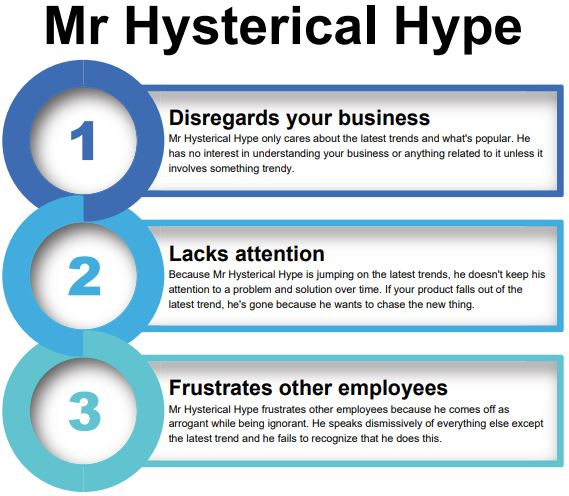
Corporate America offers some fascinating wildlife that you seldom see in the world of entrepreneurship and results-oriented work. In the Meet Mr Series, we meet some of these corporate creatures and their challenges for talent management. One of these costly creatures in corporate America is Mr Hysterical Hype. Mr Hysterical Hype thinks dismissively about the problems your company faces and is focused on the latest trends that have a future. He seems to know what the future will look like but can never elucidate how these trends solve the problems faced in your business. In some cases, Mr Hysterical Hype will simply advise that it's time to change the company anyway, as we'll see in our fictional story.
But first, a fictional story. Because I'm creating a fictional stories as examples in this series, I'll call Mr Hysterical Hype in my story Harry. As a reminder, our fictional company is ABCZ Corporation, but since this fictional company will be a mining company for this story, we'll call it ABCZ Mining Corporation.
Story
"As you can see with the data," John started pointing to a PowerPoint slide with graphs, "We're at a crossroads here at ABCZ Mining Corporation. Gold is priced at $1600 an ounce but our energy costs to extract and transport from our mines continues to rise. In addition, we're hearing about environmental groups that want to create a hostile mining environment. These groups are lobbying politicians to change laws that will make it difficult for us to extract gold and other resources." John paused while he pressed a key on his laptop to go to the next slide showing a negative yielding graph. "I expect us to struggle to be profitable over the next decade unless we start shutting down some of our mines that struggle to be profitable and maybe even some of the moderately profitable mines."
"But restarting a mine is extremely expensive," Sarah objected. "If we shut down those mines and lay off those workers, that will save us money right now, but what about the restarting costs?"
"The customer will have to pay," John replied. "I feel your concern here, but we must remember that the cure for low prices is low prices. We won't be restarting those mines until gold is over $10,000 an ounce and maybe even higher. The customer will pay the price when they see that low prices aren't the answer they think - a business has to be profitable to exist." Harry rolled his eyes when John responded and start wheeling around in his chair. "Do you have any thoughts to add to my comments Harry?" John asked.
"Guys, we're debating the past here," Harry replied as he stood up in front of the participants around the table. "We're talking about gold and mining like it's the twentieth century. We live in the age of AI. Gold is all over asteroids, why are we even debating the costs of mining gold on Earth when we could just mine gold on asteroids with AI and make billions. We only have a few years before AI takes over and does everything for us, and yet we're all sitting around this table talking about mining gold on Earth." Harry picked up his phone and pointed to it. “In the future, a device this simple will be able to extract all the gold we’ll ever need from an asteroid. Why are we even wasting time debating about the costs and revenue from a mine?”
"Where are you getting that gold is 'all over' asteroids," John asked.
"I read it in this science magazine article while waiting on my doctor," Harry replied. "Plus, haven't you guys heard of ChatGPT. You can see that none of us are going to be working in a few years. AI will do everything for us and we'll all be richer than God. Imagine a life of no work while we get everything we need. Robots will do the mining while we’ll be sipping mai tais on the beach."
"Let's assume that everything you've said is correct that gold is all over asteroids and we can have AI mine gold on asteroids," John started. "How much would it cost to create the mining equipment needed to extract gold from asteroids plus how would you test that it would work ahead of time before spending billions on a failure?"
"I'm not exactly sure, but ChatGPT probably already knows" Harry replied with a laugh, but he noticed that no one else laughed too so he stopped.
"Hmm interesting, how much energy would be required to land that mining equipment on an asteroid - and what energy source would you use, plus how much would that all cost?" John asked.
"It would probably cost less than landing a man on the moon because we'd obviously use an improvement in the technology," Harry replied.
"Do you know how much it cost to land a man on the moon adjusting for inflation?"
"No."
"Fascinating," John continued, "How much rock on an asteroid would you need to extract before you get the equivalent of one metric tonne of gold?"
"I'm not exactly sure," Harry replied.
"Do you know the estimate amount of rock we have to extract on Earth in order for us to get one metric tonne of gold?" John asked.
"No." As Harry said this, many of the participants started to shift uncomfortably in their chair. They could sense that Harry didn't understand mining or the complexity involved in mining - these were surface level questions. He also didn't even understand the complexity of his own suggestion. "Look," Harry said after a pause, "I don't need to know any of this because AI is the future. AI will do all our work and we won't need to know this menial stuff."
"If you think AI is the answer, ask your AI what's the inflation adjusted expectation of mining one metric tonne of gold from an asteroid?" John replied. "I assume since you think AI is the answer to everything then you have the ability to ask this on your phone. Go ahead and do it." Harry did as John asked and asked his AI bot the question. The AI replied with "at least two hundred billion dollars to mine one metric tonne of gold from an asteroid with the assumption that technology significantly improves over the next few decades."
"Two hundred billion dollars to mine a little over thirty five thousand ounces," John said with a huge smile looking at Harry. "Do you know the cost per ounce of gold if that was achievable. Who would be able to afford gold, especially in a world where AI does all the work for us and none of us have incomes? For one, we're not even close to having that technology or even being able to pay that cost. Second, just like the only cure for low prices is low prices, the only cure for high prices is high prices. If people can't afford a product, then demand drops. But if demand drops, then it's unsustainable to supplying the product. Whether you like it or not, this is one of many problems with people who go around saying AI will do everything. You only reflect how little you understand about the economic and business impact of that statement is."
"I don't care about any of this, whether any of you like it or not, AI is the future," Harry interrupted with a loud voice. "We should stop mining and become an AI company. Who cares about gold? The future is AI. You guys are living in the twentieth century!"
"Who cares about gold - exactly. That says everything. We are a gold mining company, not a company that jumps on the latest hype that will be exposed as mostly fraudulent in a decade," John said.
What the Research Shows
The fictional story above seems absurd at first glance, yet as I've done research on trend shifts on business, it's more common than you'd think. Over one out of four employees report that their leadership often engages in rapid shifts to their business, even if these rapid shifts don't make sense. Employees seldom report this confusion to talent management, even if the shift disrupts their focus because it feels that the company lacks a consistent vision.
I'll never forget one experience I had like this about a decade ago - executives shared the excitement of a new trend and direction for the company. My colleagues nailed it perfectly after the meeting when say said, "They have no idea what to do with this company." This new direction actually created a drop in employee morale. Shifts in vision may make sense in some cases when responding to a challenging environment. But some shifts are not actual shifts but misunderstandings of the business.
For those of you who've been in business for decades, the above story will remind you of the dotcom companies. People were literally creating dotcom companies that made absolutely no business or economic sense - selling ice to be shipped online. While some of those ideas survived because they had to improve their understanding of how to make their idea profitable, many of the ideas failed terribly. However some of you may recall that any business that didn't have a dotcom site was told that it would become irrelevant within a decade or less. I recall one septic company being told this in those days; that septic company not only exists to this day, it's been one of the most profitable companies in the past few decades all without a single web product.
Costs
Talent management should recognize that Mr Hysterical Hype doesn't care about your business. He lives for the latest trend. When you ask him questions about how your business works, he dismisses this as irrelevant details. "Hop on board the train to the future man," he says to you because this means he doesn't have to learn how your business works. The irony of Mr Hysterical Hype is that if he understood the business in detail, he might be able to make some suggestions that could improve your business - but he first has to understand the problem he's solving.
Mr Hysterical Hype frustrates other employees leading to talent management paying other costs. Talented employees find him arrogant yet extremely ignorant and avoid situations that involve him such as meetings or tasks. Management can be misguided in some cases in thinking he understands the problem. Even worse, he may be in management or he may be an executive and he’ll cost your organization as a whole.
The Meet Mr Series
All images are either sourced from Pixabay or created unless explicity stated. All written content and created images are copyright, all rights reserved. None of the content may be shared with any artificial intelligence.




